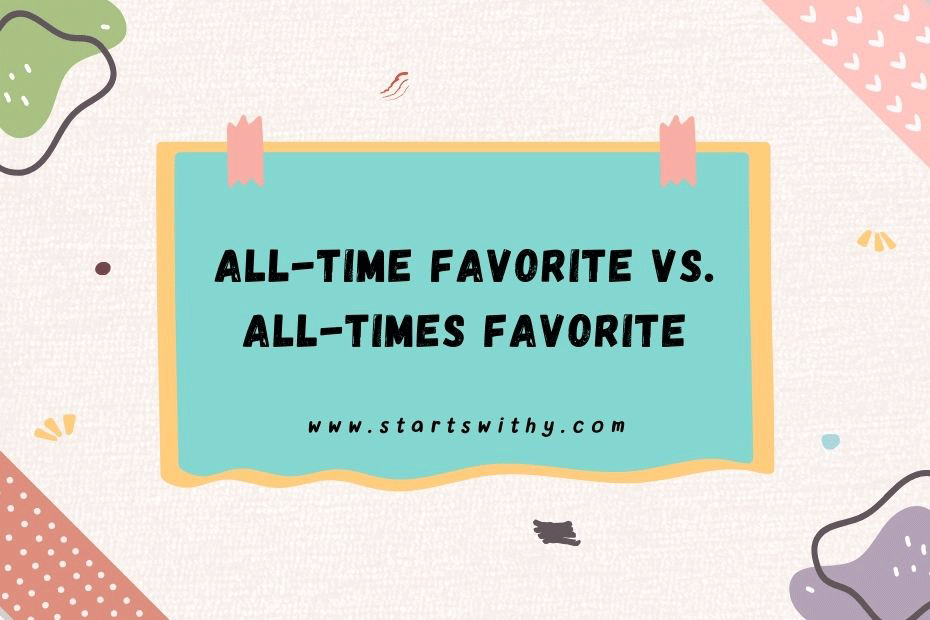As an expert blogger, I’ve delved into the nuances of language to explore the correct usage of “all time favorite” and “all times favorite.” Let’s clear up any confusion and delve into the grammatical distinctions between these two phrases.
When it comes to expressing your unwavering adoration for something, precision in language is key. The subtle difference between “all time favorite” and “all times favorite” can significantly impact the clarity and professionalism of your writing.
Join me as we navigate the realm of proper English grammar and discover why “all time favorite” reigns supreme as the widely accepted and grammatically correct phrase. Let’s dive into examples and insights to ensure your writing shines with linguistic finesse.
All Time Favorite and All Times Favorite Correct Usage
Understanding “All Time Favorite”
When we talk about something being our “all-time favorite,” we are emphasizing that it is our ultimate favorite choice across all periods of time. The term “all time” is singular and should be hyphenated when used as an adjective to describe our favorite thing that has stood the test of time.
Understanding “All Times Favorite”
Conversely, “all times favorite” is not the proper English usage. Using “all times” in this context can lead to confusion and may reflect poorly on the professionalism of your writing. It is crucial to stick to the correct grammar to communicate your ideas effectively.
When to Use Each Phrase
Remember, the correct and widely accepted phrase is “all-time favorite.” This phrase is commonly used in everyday conversations, literature, and various media forms to convey a timeless favorite. On the other hand, “all times favorite” is almost considered incorrect and should be avoided in formal writing.
Examples of Correct Usage
Example 1: “All Time Favorite”
When we talk about “all-time favorite,” we refer to something that holds a special place in our hearts throughout our lives. For instance, The Godfather is her all-time favorite movie due to its captivating storyline and iconic performances. This phrase emphasizes the significance of a singular, timeless preference.
Example 2: “All Times Favorite”
Conversely, “all times favorite” is not the correct way to express this sentiment. Using “all times” in this context is grammatically incorrect and can lead to confusion in writing. For instance, saying “Michael Jordan is my all times favorite athlete” is an incorrect usage that should be avoided in formal writing.
Example 3: Proper Usage in Sentences
To ensure effective communication, it’s crucial to use the correct phrase. Here are a few examples of proper usage in sentences:
- She describes Paris as her all-time favorite city to visit.
- They consider pizza to be their all-time favorite food due to its versatility.
- Thanksgiving is her all-time favorite holiday because of the family gatherings.
Choosing the right phrase, “all-time favorite,” allows us to convey our deep-seated preferences accurately and ensures clarity in our expressions.
Common Mistakes to Avoid
Confusing the Two Phrases
When it comes to distinguishing between “all-time favorite” and “all times favorite,” the confusion often arises due to their similar sound. However, it’s essential to remember that “all-time favorite” is the correct and widely accepted term for expressing a timeless preference. On the other hand, “all times favorite” is grammatically incorrect and can lead to confusion in written communication. A useful tip to avoid this mistake is to think of “all-time favorite” as a special status reserved for something cherished over an indefinite period.
Incorrect Use in Context
One common mistake seen in writing is using “all times favorite” when referring to a singular entity. This incorrect usage can undermine the clarity and professionalism of your message. For instance, labeling a legendary athlete like Michael Jordan as an “all times favorite” athlete can distract readers from the intended meaning. To ensure precise communication, always opt for “all-time favorite” when expressing deep-seated preferences for specific individuals or things.
- Reserve “all-time favorite” for expressing enduring preferences.
- Avoid using “all times favorite” to prevent confusion and maintain linguistic correctness.
- Double-check your choice of phrase to ensure consistency and precision in conveying your preference for a particular subject matter.
Conclusion
Ensuring the correct usage of “all-time favorite” versus “all times favorite” is crucial for effective communication. By avoiding common mistakes and understanding the nuances between these phrases, we can convey our preferences clearly and professionally. Remembering to use “all-time favorite” for expressing lasting preferences will enhance the clarity and impact of our written content. Consistency and precision in language choice are key to accurately conveying our preferences. By following these guidelines, we can elevate the quality of our communication and avoid potential misunderstandings.



